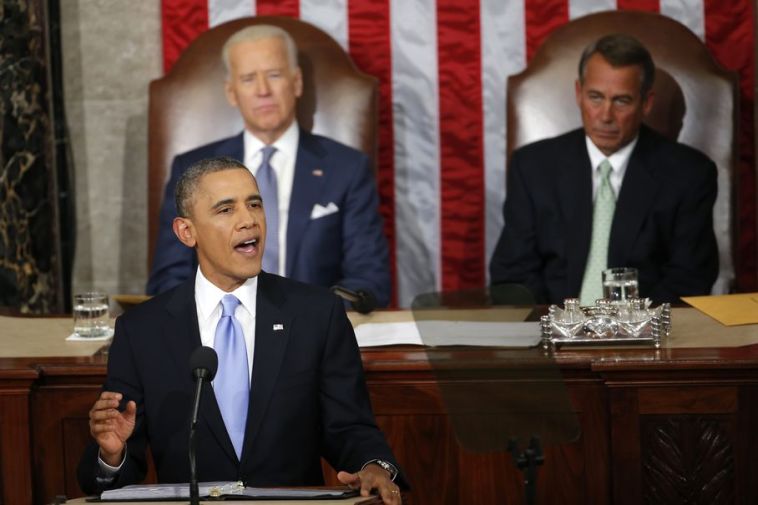President Obama is waving the red cape in front of Republicans—and the American people—threatening to push the limits of executive action if they don’t give him what he wants. Republicans should call his threat and remind him of (1) how often he criticized such actions as a presidential candidate and (2) just how much worse they can make the legislative process, and his presidential legacy, if Obama becomes the “unilateral president.”
Videos By Rare
Some commentators are dismissing Obama’s comments as political hype, asking rhetorically what constitutional authority he has to go it alone. That would be a reasonable question if this president were constrained by the Constitution. Evidence from the past five years suggests he’s not.
No one would have thought Obama would have taken it upon himself to determine when the Senate is or is not in session, and make recess appointments based on his decision. Can you imagine the pushback from Senate hardliner like the late Majority Leader Robert Byrd (D-W.V.) who, unlike Harry “Rubberstamp” Reid, fiercely protected the Senate’s constitutional boundaries? Yet that is exactly what Obama did, leading to a recently argued case before the Supreme Court.
And no one would have predicted that Obama would, or even could, unilaterally postpone parts of his own health care law because of the government’s ineptness in implementing it. But that’s exactly what he’s done—some seven times.
For Obama, the Constitution isn’t a document to be revered, it’s an obstacle to overcome. And his administration has been very creative in devising new ways to bypass it.
For their part, Republicans—and if there’s still any Robert Byrd Democrats—should put the White House on notice: Attempts to unconstitutionally sidestep Congress will be met with resistance. Here are some options.
1. Lawsuits — The Supreme Court just heard a challenge to Obama’s decision that he can decide when the Senate is in session. The justices didn’t seem impressed with the power grab—perhaps because they know if Obama can usurp the legislative branch of government, he can usurp the judicial.
Republicans should double down on their lawsuit efforts every time the unilateral president goes on an executive order binge. Lawsuits may take too long to address problems in the short run, but they highlight the president’s imperialism.
2. Subpoena the president — What did the president know and when did he know it—about Benghazi, the IRS scandal, targeting journalists, Fast and Furious, the Obamacare website disaster, and many more? Congress should subpoena Obama and other White House officials, just Democrats did to President George W. Bush over the firing of several U.S. attorneys. Obama won’t agree to testify—though a federal judge ruled in 2008 that executive-branch immunity is not absolute—but subpoenas remind people that the president knows things he isn’t revealing.
3. Stop all legislation — Speaker John Boehner could take a page from Harry Truman by emphasizing that “the bucks stop here”—i.e., government appropriations. Boehner should tell the president that if he insists on bypassing Congress to implement major reforms, even minor bills will pile up in the House and never be brought up for a vote. Committee chairmen used to exercise that option all the time a few decades ago. It was their way of ensuring that other members and the president had to work with them.
4. Begin a series of investigations — The House is engaged in numerous investigations, but it can do more. The investigation authority is regularly used and often abused. For example, when then Energy and Commerce Chairman Henry Waxman (D-Calif.) concluded in the summer of 2009 that health insurers weren’t sufficiently on board supporting Obamacare, he demanded they answer numerous useless questions. It was his way of letting everyone know who’s the boss.
Congressional committees can investigate Obama, or his donors, or others, until someone says “uncle.” Hey, just take a lesson from the IRS’s playbook if they need an example.
5. Act on “legislative authority.” Obama has apparently decided it’s better to ask for forgiveness than permission—only he never seems to do the former when proven wrong. Well, if the president can take executive action, maybe Congress can take “legislative action” by acting first and asking questions later.
The president has his lawyers sifting through the laws and history books to see what he can do; Republicans can, too. This issue is bigger than Obama and his agenda. The Constitution establishes a legislative process and Republicans need to be as creative in defending the congressional role in it as Obama is in trying to skirt it.
[protected-iframe id=”3ae477cd460158832ad86160d8c6eade-46934866-51331093″ info=”http://embed.newsinc.com/Single/iframe.html?WID=2&VID=25569675&freewheel=91379&sitesection=rare&height=320&width=425″ width=”425″ height=”320″ scrolling=”no”]

